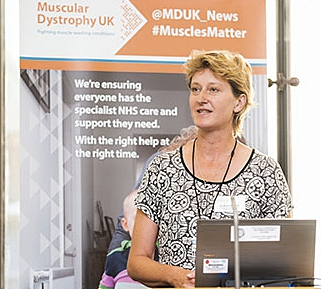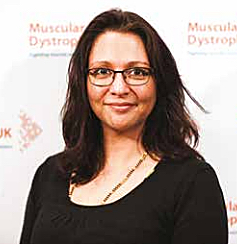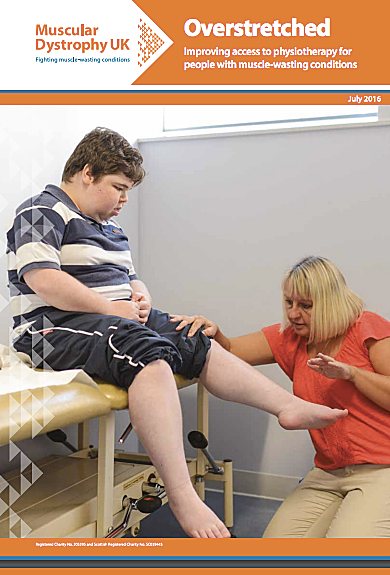UK Physios Warn Physiotherapy Shortage for Muscular Dystrophy Can Costs Lives
Written by |

 Two British physiotherapists invited to speak at a July 20 event at the Houses of Parliament in London by Muscular Dystrophy UK, informed the Parliament and commissioners about a serious shortage throughout the U.K. of physiotherapy for people with muscle-wasting diseases such as muscular dystrophy.
Two British physiotherapists invited to speak at a July 20 event at the Houses of Parliament in London by Muscular Dystrophy UK, informed the Parliament and commissioners about a serious shortage throughout the U.K. of physiotherapy for people with muscle-wasting diseases such as muscular dystrophy.
Specialist neuromuscular physiotherapists Gita Ramdharry and Anna Mayhew both articulated a growing need to increase physiotherapy capacity at neuromuscular centers across the UK, and for advocating more funding for physiotherapy research in the neuromuscular field.
 Mayhew, a consultant research physio at the University of Newcastle’s John Walton Muscular Dystrophy Research Centre, said in her address: “There is considerable evidence from documents such as the Walton Report that highlights the shortage of hands-on physiotherapy for children and adults with neuromuscular diseases. The evidence for action is here, the time for action is now.”
Mayhew, a consultant research physio at the University of Newcastle’s John Walton Muscular Dystrophy Research Centre, said in her address: “There is considerable evidence from documents such as the Walton Report that highlights the shortage of hands-on physiotherapy for children and adults with neuromuscular diseases. The evidence for action is here, the time for action is now.”
 Ramdharry, of the University College London’s MRC Centre for Neuromuscular Diseases supported the plea.
Ramdharry, of the University College London’s MRC Centre for Neuromuscular Diseases supported the plea.
“It’s time to recognize the barriers, see the benefits and support the many committed physiotherapists across the country united in wanting better lives for people with muscle-wasting conditions,” Ramdharry said.
The event, also attended by the U.K.’s Deputy Chief Medical Officer Gina Radford, service users, specialist physiotherapists and representatives from the National Institute for Health Research, was held to mark the publication of “Overstretched, a report from Muscular Dystrophy UK”. The report reveals that 60 percent of people with muscular dystrophy in the U.K. are unable to access appropriate physiotherapy treatment, although the therapy is central to successful management of the condition. Nine specialist physiotherapists contributed to the document. Ramdharry wrote the foreword.
 The report also maintains that shortages of respiratory physiotherapists and breathing equipment are putting lives at risk and increasing costs to the National Health Service (NHS) for emergency hospital admissions that could be avoided. It notes that in many cases individuals can only access physiotherapy on a short-term basis, often in six-week blocks — considered inappropriate for people living with long-term condition, like muscular dystrophy, who need more flexible and longer term support.
The report also maintains that shortages of respiratory physiotherapists and breathing equipment are putting lives at risk and increasing costs to the National Health Service (NHS) for emergency hospital admissions that could be avoided. It notes that in many cases individuals can only access physiotherapy on a short-term basis, often in six-week blocks — considered inappropriate for people living with long-term condition, like muscular dystrophy, who need more flexible and longer term support.
Muscular Dystrophy UK is calling for Hospital Trusts and NHS clinical commissioning groups to ensure that local muscle disorder therapy teams include a specialist physiotherapist, and that they help patients with muscle-wasting conditions gain access to physiotherapy when needed.
Ramdharry commented in a Muscular Dystrophy UK press release: “As physiotherapists, our primary aim should be to support people with muscle-wasting conditions to live well with their condition. Every child with a muscle-wasting condition deserves this, but the scant provision of specialist and community pediatric services means that many are missing out. In adulthood, access is even more restricted, with community service models being geared towards conditions that improve with rehabilitation, not progressing conditions.”
The hard-hitting report documents serious physiotherapy access shortage across many parts of the UK, and finds the lack of facilities damaging health, quality of life and, in cases when a patients need respiratory support — length of life.
The report can be downloaded at:
https://www.musculardystrophyuk.org/app/uploads/2016/07/Physio-Report-July-2016-1.pdf





